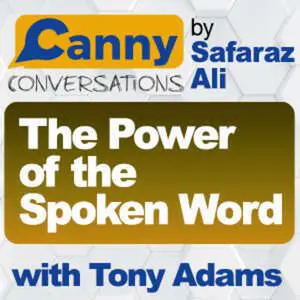Safaraz Ali is joined by journalist and broadcaster Tony Adams to discuss the power of the spoken word and in particular the power of radio. Saf talks about his eclectic tastes in radio and his enthusiasm for grass roots community stations. They talk about how radio has changed and what the future looks like. A topic they touch upon is the huge amount of choice now available to listeners but debate if this is at the expense of quality.
Broadcaster and journalist Tony Adams joins Saf to talk about the spoken word and in particular radio.
They consider how the radio landscape has changed over a lifetime. People who do not consider themselves to be very old will remember a time when listening to the ‘wireless’ involved a choice between the BBC Light Programme (now Radio 2), the Third Programme (Now Radio 3) and the Home Service (Radio 4) or the Pirate stations. Perhaps the golden age for radio were the war years before the arrival of television for the masses. TV had started in a small way before World War Two but really took off in the 1950s.
The extension of programming started with the introduction of BBC Local Radio stations and has grown ‘like topsy’ in the subsequent decades.
They share their own relationship with radio and Saf reveals the eclectic mix of programmes that he has listened to over the years. He enthuses about the power and value of local community radio and how it engages with the people it serves in a way that is not possible for national stations.
They have plenty to say about the huge choice now available to radio listeners and the benefits of the platform highlighting its intimacy and accessibility. But they also debate if this is at the cost of quality and how radio needs to make sure that it does not, especially at local level, allow itself to be a platform for ‘a regular few’ promoting their own agenda and the importance of making listeners appreciate the difference between news and opinion.
Radio stations are regulated, and this is discussed along with the question as to if more needs to be done. This includes the important question of editorial independence and the need to ensure advertisers do not impair editorial integrity.
